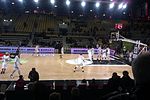Crédit Mutuel
Banks established in 1882Banks under direct supervision of the European Central BankCrédit MutuelFrench brands

Crédit Mutuel is a French cooperative banking group, one of the country's top five banks with over 30 million customers. It traces its origins back to the German cooperative movement inspired by Friedrich Wilhelm Raiffeisen in Alsace–Lorraine under German rule, in the 1880s. Crédit Mutuel was a member of the International Raiffeisen Union (IRU). Crédit Mutuel has been designated as a Significant Institution since the entry into force of European Banking Supervision in late 2014, and as a consequence is directly supervised by the European Central Bank.
Excerpt from the Wikipedia article Crédit Mutuel (License: CC BY-SA 3.0, Authors, Images).Crédit Mutuel
Rue Frédéric-Guillaume Raiffeisen, Strasbourg Wacken
Geographical coordinates (GPS) Address Nearby Places Show on map
Geographical coordinates (GPS)
| Latitude | Longitude |
|---|---|
| N 48.6005 ° | E 7.7566 ° |
Address
Rue Frédéric-Guillaume Raiffeisen 4
67001 Strasbourg, Wacken
Grand Est, France
Open on Google Maps








